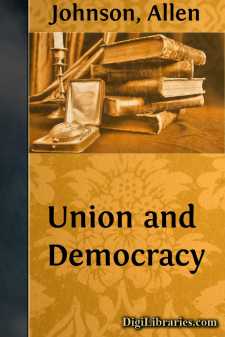History
- Africa 30
- Americas (North Central South West Indies) 50
- Ancient 68
- Asia 58
- Australia & New Zealand 8
- Canada 41
- Caribbean & West Indies 1
- Civilization 20
- Eastern Europe 12
- Europe 310
- Expeditions & Discoveries 60
- General 77
- Historical Geography 1
- Jewish 9
- Latin America 3
- Medieval 8
- Middle East 13
- Military 248
- Revolutionary 8
- Study & Teaching 5
- United States
- Western Europe 56
- World 13
United States Books
Sort by:
by:
Emma Look Scott
THE FLAG GOES BY HATS off!Along the street there comesA blare of bugles, a ruffle of drums,A flash of color beneath the sky;Hats off!The flag is passing by! Blue and crimson and white it shines,Over the steel-tipped ordered lines,Hats off!The colors before us fly!But more than the flag is passing by.Sea-fights and land-fights, grim and great,Fought to make and to save the State.Weary marches and...
more...
CHAPTER I A UNION IN FORM ONLY When did the sovereign nation of the United States begin? From one point of view, it was called into existence by the motion for Independence passed by the Continental Congress on the second day of July, 1776, when the people of the rebelling British colonies in America, by action of their representatives, assumed a free and independent position. But a motion is...
more...
PREFACE The purpose of this volume is to show the action and reaction of the most important social, economic, political, and personal forces that have entered into the make-up of the United States as a nation. The primary assumption of the author is that the people of this country did not compose a nation until after the close of the Civil War in 1865. Of scarcely less importance is the fact that the...
more...
CHAPTER I. Original Compromises between the North and the South embodied in the Constitution.—Early Dissatisfaction with National Boundaries. —Acquisition of Louisiana from France by President Jefferson.— Bonaparte's Action and Motive in ceding Louisiana.—State of Louisiana admitted to the Union against Opposition in the North.— Agitation of the Slavery Question in Connection with the...
more...
CHAPTER I. Abraham Lincoln expired at twenty-two minutes after seven o'clock on the morning of April 15, 1865. Three hours later, in the presence of all the members of the Cabinet except Mr. Seward who lay wounded and bleeding in his own home, the oath of office, as President of the United States, was administered to Andrew Johnson by Chief Justice Chase. The simple but impressive ceremony was...
more...
INTRODUCTION. Medals, by means of the engraver's art, perpetuate in a durable form and within a small compass which the eye can embrace at a glance, not only the features of eminent persons, but the dates, brief accounts, and representations (direct or emblematical) of events; they rank, therefore, among the most valuable records of the past, especially when they recall men, deeds, or...
more...
by:
Theodore Sutro
INTRODUCTORY. The Thirteen Paintings, to a history and description of which (and incidentally to a brief memoir of their creator, Edward Moran) these pages are devoted, are monumental in their character and importance. Mr. Moran designated them as representing the "Marine History of the United States." I have somewhat changed this title; for even the untraversed "Ocean" and the landing...
more...
by:
Allen Johnson
CHAPTER I THE ORDEAL OF THE CONFEDERATION It was characteristic of the people of the United States that once assured of their political independence they should face their economic future with buoyant expectations. As colonizers of a new world they were confident in their own strength. When once the shackles of the British mercantile system were shaken off, they did not doubt their ability to compete...
more...











